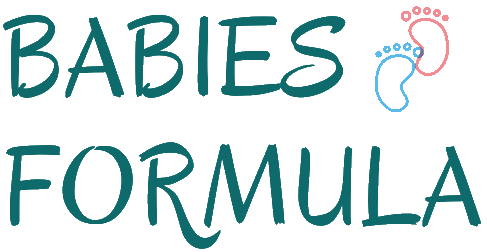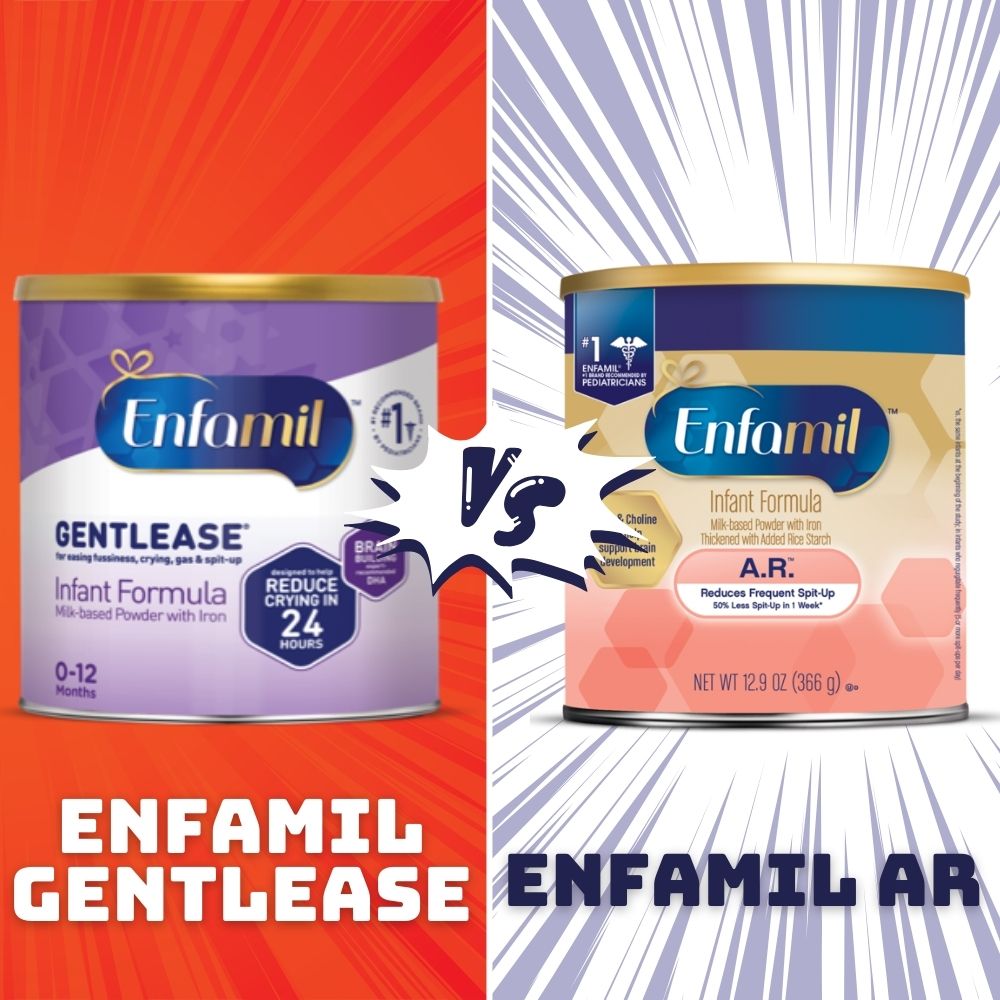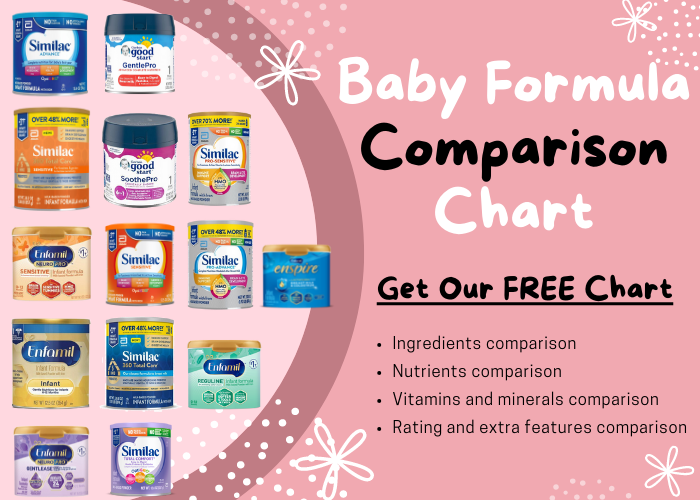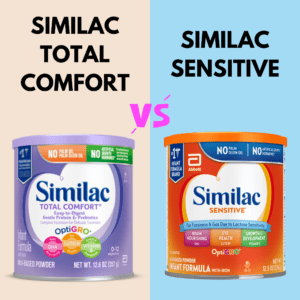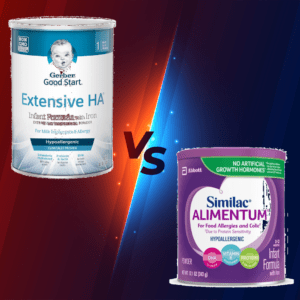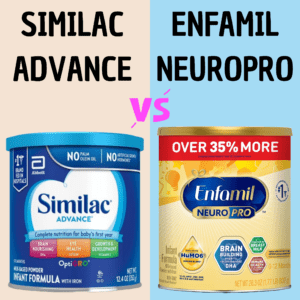What is The Difference Between Enfamil Gentlease and Enfamil AR?
Enfamil Gentlease is a partially hydrolyzed formula designed for sensitive tummies, reducing fussiness and gas whereas Enfamil AR is a regular formula with added rice starch and double prebiotics to help reduce spit-up.
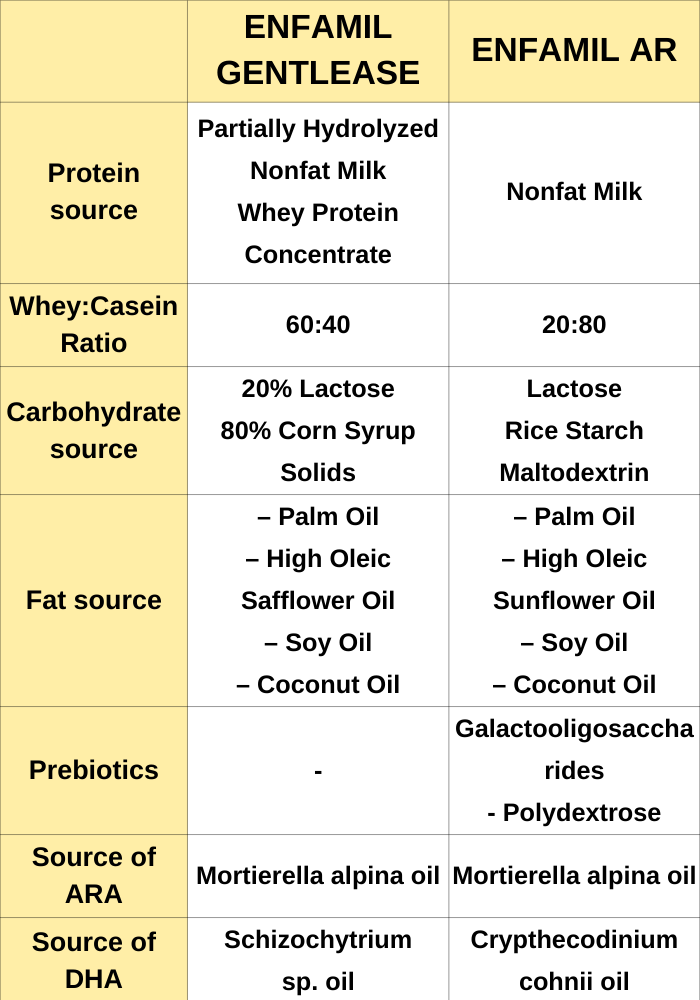
“When you buy something using my links, I may earn a small commission at no additional cost to you. This is a kind of support to me. This website doesn’t accept money for reviews. “
The Best One?
Determining the “best” formula between Enfamil Gentlease and Enfamil AR depends on your baby’s specific needs and preferences. Both formulas have their advantages, and the choice should be based on what works best for your infant. Here are some considerations:
- Digestive Sensitivity: If your baby has digestive issues, such as gas, fussiness, or colic, you might want to consider Enfamil Gentlease. It contains partially hydrolyzed proteins, which can be gentler on sensitive stomachs.
- Reflux or Spit-up Issues: If your baby experiences frequent spit-up or reflux, Enfamil AR, with added rice starch to thicken the formula, will be a better choice. The thicker consistency can help reduce the frequency of spit-up.
- Nutrition: Both formulas offer similar levels of essential nutrients and vitamins, so your baby’s nutritional needs should be adequately met with either choice.
- Price: Consider your budget and the pricing options available for the formula sizes you prefer. Enfamil Gentlease tends to be more cost-effective in most size options.
- User Ratings: Both formulas have high user ratings, indicating that many parents have had positive experiences with them. Reading reviews from other parents can provide insights into how these formulas have worked for babies with similar needs.
- Consult with a Healthcare Professional: Always consult with your pediatrician or a healthcare professional before making a decision. They can offer guidance based on your baby’s specific circumstances and dietary requirements.
Ingredients Comparison:
Protein Source:
Enfamil Gentlease uses a combination of partially hydrolyzed nonfat milk and whey protein concentrate. It boasts a whey-to-casein ratio of 60:40, which is a great balance for many infants.
Partially hydrolyzed protein consists of breaking down the proteins into smaller, more easily digestible pieces. It’s an excellent choice for infants who may have sensitivity to regular milk-based formulas, as it can be gentler on their developing digestive systems. So, if your little one tends to experience fussiness or gas after feeding, this feature in Enfamil Gentlease could make a real difference in their comfort and well-being.
On the other hand, Enfamil AR relies on nonfat milk as its protein source and has a different whey-to-casein ratio, which is 20:80. This means it has a higher proportion of casein, which can make it thicker and potentially more satisfying for some babies.
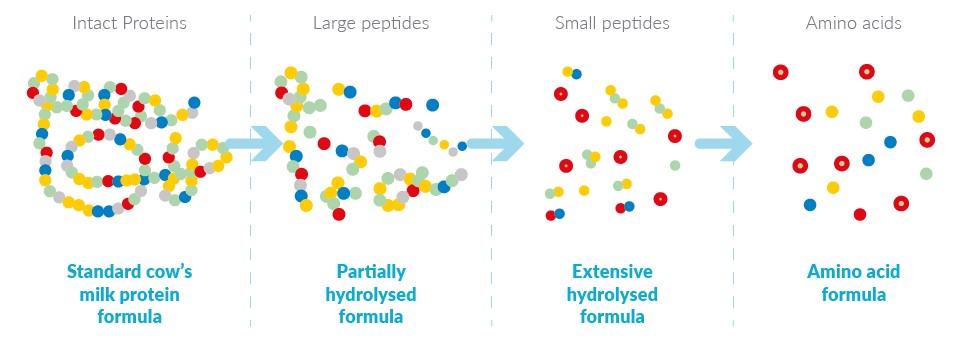
If your baby has no health issues you may want to consider regular formulas like Enfamil Neuropro. I did a full article about Enfamil Neuropro Vs Enfamil Gentlease if you want to check.
Carbohydrate Source:
When it comes to carbohydrates, Enfamil Gentlease uses a mix of 20% lactose and 80% corn syrup solids whereas Enfamil AR uses a combination of lactose, rice starch, and maltodextrin. The addition of rice starch is what gives this formula its thicker consistency, which can be helpful for infants with reflux or spit-up issues.
Fat Source:
In terms of fats, both formulas have the same fat sources palm oil, soy oil, coconut oil, and high oleic sunflower or safflower oil.
- Palm Oil: Palm oil is used in baby formula as a source of saturated fats. Saturated fats are essential for providing energy to infants and are important for brain development.
- Coconut Oil: Coconut oil is included in baby formula for its medium-chain triglycerides (MCTs), which are easily digestible and provide a quick source of energy for infants. It is also known for its potential health benefits, although its use in formula is usually in combination with other oils.
- High Oleic Sunflower or Safflower Oil: High Oleic sunflower or safflower oils are used in baby formula primarily for their stability and resistance to oxidation. This helps extend the shelf life of the formula, ensuring it remains safe and nutritious for an extended period.
- Soy Oil: Soy oil is a plant-based alternative to animal fats like dairy fat. It serves as a source of essential fatty acids, particularly omega-6 fatty acids.
Prebiotics:
Enfamil AR includes prebiotics in the form of galactooligosaccharides and polydextrose. These prebiotics can support your baby’s digestive health while Enfamil Gentlease doesn’t have a prebiotic.
Related: Enfamil Gentlease Vs All Gerber Good Start Formulas: The Ultimate Comparison
Nutrients Comparison:
Micronutrients and Vitamins:
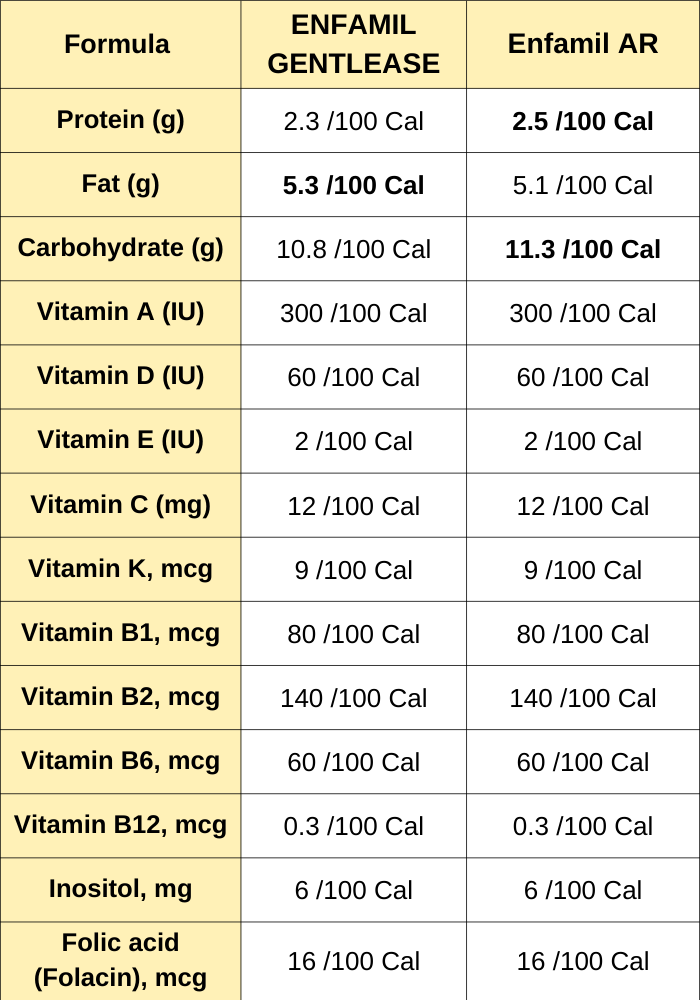
Starting with protein, both formulas provide essential protein content, with Enfamil Gentlease offering 2.3 grams per 100 calories, and Enfamil AR providing slightly more at 2.5 grams per 100 calories. Moreover, Enfamil AR provides more carbohydrates whereas Enfamil Gentlease is enriched with fats.
When it comes to vitamins, both formulas are evenly matched. They provide the same amounts of key vitamins like A, D, E, C, K, B1, B2, B6, B12, and inositol, ensuring that your baby receives the necessary micronutrients for healthy development.
Additionally, both Enfamil Gentlease and Enfamil AR supply 16 micrograms of folic acid per 100 calories. Folic acid is crucial for neural tube development in newborns.
So, in terms of micronutrients and vitamins, you can rest assured that both Enfamil Gentlease and Enfamil AR provide a well-balanced profile to support your baby’s growth and overall health. When choosing between the two, you can focus on other factors like your baby’s specific dietary needs or any gastrointestinal concerns.
Related: Enfamil Gentlease Vs All Similac Formulas: The Ultimate Comparison
Minerals:
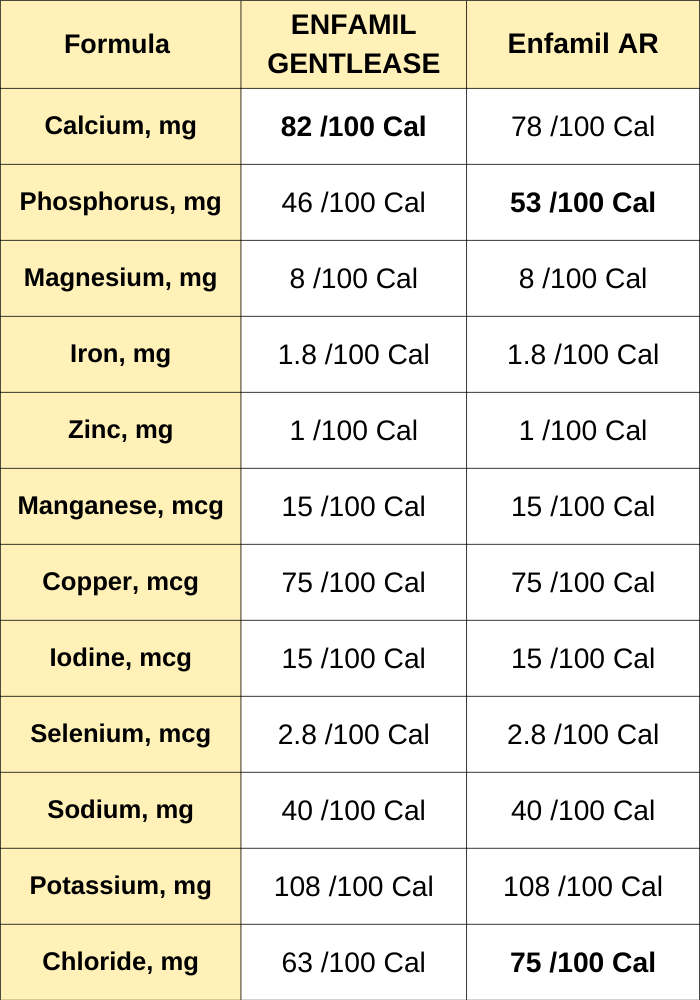
Now, let’s talk about the mineral content in both Enfamil Gentlease and Enfamil AR. These minerals play a crucial role in your baby’s overall health and development.
In terms of key minerals, both formulas are quite similar. They offer balanced amounts of magnesium, iron, zinc, manganese, copper, iodine, selenium, sodium, and potassium per 100 calories, ensuring your baby gets the essential nutrients they need.
However, there are some differences, Enfamil AR has more Phosphorus and chloride whereas Enfamil Gentlease has more Calcium.
Related: Similac Total Comfort Vs. Enfamil Gentlease
Price Comparison:
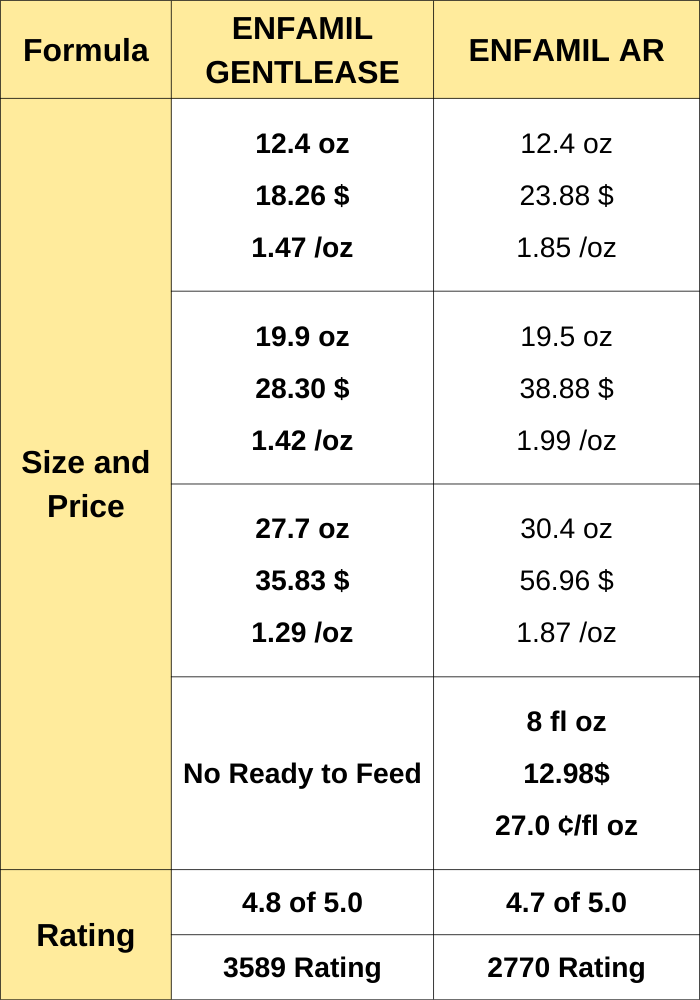
Now, let’s talk about the practical aspect of these formulas – their size and price. These factors can play a significant role in your decision-making process.
Here’s a breakdown for both Enfamil Gentlease and Enfamil AR in different sizes:
Small size:
- Enfamil Gentlease comes in a 12.4 oz size, priced at $18.26, which translates to approximately $1.47 per ounce.
- On the other hand, Enfamil AR also offers a 12.4 oz size but is priced slightly higher at $23.88, making it around $1.85 per ounce.
For larger sizes:
- Enfamil Gentlease provides a 19.9 oz option, priced at $28.30, which comes out to approximately $1.42 per ounce.
- Meanwhile, Enfamil AR offers a 19.5 oz size, but it’s priced at $38.88, making it approximately $1.99 per ounce.
In the largest sizes available:
- Enfamil Gentlease offers a 27.7 oz option, priced at $35.83, which is about $1.29 per ounce.
- Enfamil AR provides a 30.4 oz size, but it’s priced at $56.96, making it around $1.87 per ounce.
It’s also worth noting that Enfamil Gentlease doesn’t offer a ready-to-feed option, while Enfamil AR has an 8 fl oz ready-to-feed option priced at $12.98, which is approximately 27.0 cents per fluid ounce.
When it comes to size and price, Enfamil Gentlease tends to be more cost-effective in most size options. However, the choice might also depend on your baby’s specific needs and preferences. Both formulas have earned positive user ratings, indicating that parents have had generally good experiences with both.
Remember that every baby is unique, and what works well for one may not work for another. Your pediatrician is the best resource for guiding you through the transition and ensuring that your baby’s nutritional needs are met while keeping them comfortable and healthy.
